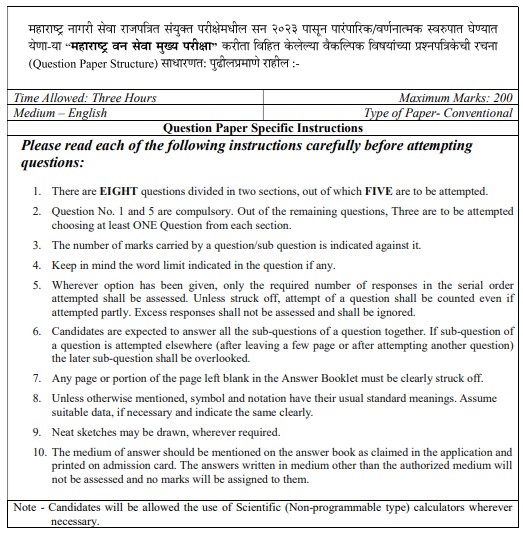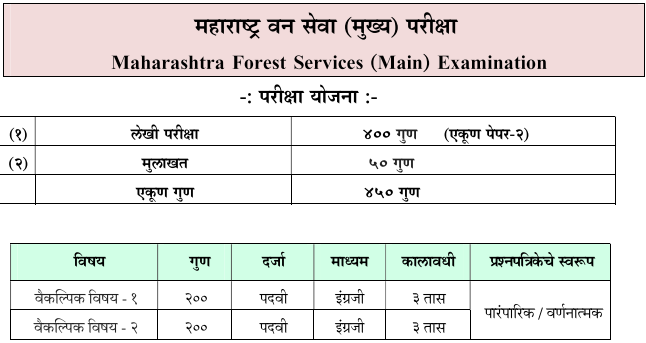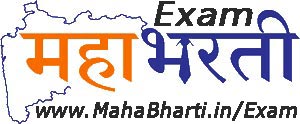MPSC Van Seva Forest Services Mains Exam New Syllabus
MPSC Forest Services Mains Exam New Syllabus: The Forest Service Main Examination Syllabus conducted by the Public Service Commission has been published by the Commission on January 24, 2023. The Maharashtra Forest Service Main Examination Syllabus has been made by the MPSC Commission in the Union Public Service Forest Service Main Syllabus. The changes in agriculture are now being prepared on the lines of the Indian Forest Service Examination of the Commission. The Commission has published the syllabus of all 14 optional subjects for the Indian Forest Service Main Examination for the Maharashtra Forest Service Examination. The syllabus of only agriculture or one optional subject for the Forest Service Main Examination has been reduced to a large extent, and the syllabus of other optional subjects has not been changed. Is the MPSC Commission deliberately trying to give undue advantage to the candidates who are agriculture graduates by reducing the syllabus of only one optional subject, agriculture? This question has arisen. The suspicion has arisen in the minds of the common examinees that the agriculture graduates working or on deputation in the Commission are misleading the Commission.
लोकसेवा आयोगामार्फत घेण्यात येणाऱ्या वन सेवा मुख्य परीक्षा अभ्यासक्रम आयोगाने दि. २४ जानेवारी २०२३ रोजी प्रसिद्ध केलेता आहे. महाराष्ट्र वन सेवा मुख्य परीक्षा अभ्यासक्रम हा संघ लोकसेवावनसेवा मुख्य अभ्यासक्रमात एमपीएससी आयोगाने केले आहेत कृषि धार्जिणे बदल आयोगाच्या भारतीय वनसेवा परीक्षेच्या धर्तीवर तयार करण्यात आता असून भारतीय वनसेवा मुख्य परीक्षेला असलेले सर्व १४ वैकल्पिक विषयाचा अभ्यासक्रम आयोगाने जसाच्या तसा महाराष्ट्र वन सेवा परीक्षेसाठी प्रसिद्ध केला आहे.वन सेवा मुख्य परीक्षेसाठी असलेल्या केवळ कृषि वा एकाच वैकल्पिक विषयाचा अभ्यासक्रम मोठ्या प्रमाणात कमी केला असून, इतर वैकल्पिक विषयाच्या अभ्यासक्रमात बदल केलेला नाही. केवळ कृषि या एकाच वैकल्पिक विषयाचा अभ्यासक्रम कमी केल्याने एमपीएससी आयोग कृषि पदवीधर असलेल्या परीक्षर्थीना जाणीवपूर्वक अवाजवी फायदा देण्याचा प्रयत्न करत आहे का? असा प्रश्न निर्माण झाला आहे. आयोगामध्ये कार्यरत अथवा प्रतिनियुक्तीवर असलेले कृषि पदवीधर आयोगाची दिशाभूल करत असल्याचा संशय सामान्य परीक्षार्थीच्या मनात निर्माण झाला आहे. तसेच या संदर्भातील पुढील सर्व अपडेट्ससाठी या लिंक वरून आपण आमच्या टेलिग्राम चॅनलला जॉईन करावे किंवा या लिंक वरून महाभरती एक्सामची अधिकृत अँप आपल्या मोबाईल मध्ये डाउनलोड करावी आणि अधिक ताज्या आणि अधिकृत महाराष्ट्र परीक्षेच्या अपडेटसाठी MahaBharti.in/exam फॉलो करा:
कृषि या एकाच वैकल्पिक विषयाचा अभ्यासक्रम कमी करण्यासाठी आयोगाने कोणती समिती अथवा कार्यपद्धतीचा अवलंब केला आहे याबाबत खुलासा
आक्षेपः संघ लोकसेवा आयोगाच्या भारतीय वनसेवा परीक्षेतील राज्याचा टक्का वाढवा म्हणून आयोगाने महाराष्ट्र वन सेवा मुख्य परीक्षा अभ्यासक्रम समान ठेवलेला आहे. परंतु कृषि या एकाच वैकल्पिक विषयाचा ३० टक्केहून अधिक अभ्यासक्रम कमी करणे परीक्षार्थीच्या समान संधीच्या तत्वाला तिलांजली देणारे आहे.
राज्याघातानेच्या कलम १६ नुसम प्राप्त समान व निकोप संधी सर्व परीक्षार्थीना देणे आयोगाचे सर्वात महत्वाचे कर्तव्य आहे. असमतोल बदल कोणाच्या सूचनेवरून केले आहेत अथवा आयोगाची दिशाभूल करणाऱ्या संबंधित अधिकाऱ्यावर योग्य ती कार्यवाही करावी अशी परीक्षार्थीची मागणी आहे.
Download MPSC Van Seva Mains Exam नवीन सिल्याबस २०२५
Download MPSC Van Seva Mains Exam Question paper Pattern
महाराष्ट्र वन सेवा परिक्षा 2025 नवीन अभ्यासक्रम जाहीर !!
MPSC Forest Services Mains Exam New Syllabus – Maharashtra Public Service Commission has published Maharshtra Forest Service Mains Exam Syllabus and Exam Pattern for 2024 exam. MPSC Van Seva Mukhya Pariksha Consist of two wriiten Paper of 400 Marks. After clearing MPSC Forest Mains Exam written, Interview will be conducted for 50 Marks. Those candidates who are preparing for MPSC Forest Services Exam need to know each details about this exam before going to apply. That’s why in this section you will get MPSC Forest Services Mains Exam New Syllabus and MPSC Forest Services Mains Exam Pattern 2025, just go through it once :
⏰MPSC Civil Engineering Syllabus And Exam Pattern
महाराष्ट्र लोकसेवा आयोगाने 2025 च्या परीक्षेसाठी महाराष्ट्र वन सेवा मुख्य परीक्षेचा अभ्यासक्रम आणि परीक्षेचा नमुना प्रकाशित केला आहे. MPSC वन सेवा मुख्य परिक्षा 400 गुणांचे दोन लिखित पेपर असतात. एमपीएससी फॉरेस्ट मेन्सची लेखी परीक्षा उत्तीर्ण झाल्यानंतर ५० गुणांची मुलाखत घेतली जाईल. जे उमेदवार MPSC फॉरेस्ट सर्व्हिसेस परीक्षेची तयारी करत आहेत त्यांनी अर्ज करण्यापूर्वी या परीक्षेबद्दल प्रत्येक तपशील जाणून घेणे आवश्यक आहे. म्हणूनच या विभागात तुम्हाला एमपीएससी फॉरेस्ट सर्व्हिसेस मुख्य परीक्षा नवीन अभ्यासक्रम आणि एमपीएससी फॉरेस्ट सर्व्हिसेस मुख्य परीक्षा पॅटर्न 2025 मिळेल, फक्त एकदा ते पहा:
⏰MPSC Mechanical Gr A And GR B Syllabus PDF
MPSC Forest Services Mains Exam Pattern 2025
महाराष्ट्र नागरी सेवा राजपत्रित संयुक्त परीक्षेमधील सन २०२३ पासून पारंपारिक/वर्णनात्मक स्वरुपात घेण्यात येणा-या “महाराष्ट्र वन सेवा मुख्य परीक्षा” करीता विहित केलेल्या वैकल्पिक विषयांच्या प्रश्नपत्रिकेची रचना (Question Paper Structure) साधारणतः पुढीलप्रमाणे राहील :-


⏰MPSC Electrical Engineering Services Syllabus And Exam Pattern
List of Optional Subjects
| (1) | Agriculture | (8) | Forestry |
| (2) | Agricultural Engineering | (9) | Geology |
| (3) | Animal Husbandry and Veterinary Science | (10) | Mathematics |
| (4) | Botany | (11) | Mechanical Engineering |
| (5) | Chemical Engineering | (12) | Physics |
| (6) | Chemistry | (13) | Statistics |
| (7) | Civil Engineering | (14) | Zoology |
Provided that the candidates will not be allowed to offer the following combination of subjects :
(a) Agriculture and Agricultural Engineering.
(b) Agriculture and Animal Husbandry & Veterinary Science.
(c) Agriculture and Forestry.
(d) Chemistry and Chemical Engineering.
(e) Mathematics and Statistics.
(f) Of the Engineering subjects viz. Agricultural Engineering, Chemical Engineering, Civil Engineering and Mechanical Engineering—not more than one subject;
Detailed MPSC Forest Services Main Examination Syllabus
| Name of Organisation | Maharashtra Public Service Commission |
| Name of Posts | Forest Services Main Examination |
| Official Website | https://www.mpsc.gov.in |
| Recruitment Details | Maharashtra Public Service Commission Forest Services Main Examination |
| Type of Test | Objective Type |
| Test Mode | Online (Computer Based Test – CBT) |
MPSC Van Seva Mains Exam Syllabus 2025
AGRICULTURE ( Subject Code – 1076)
- Ecology and its relevance to man, natural resources, their sustainable management and conservation. Physical and social environment as factors of crop distribution and production. Climatic elements as factors of crop growth.
- Cropping pattern in different agro-climatic zones of Maharashtra. Concepts of multiple cropping, multistorey, relay and intercropping, and their importance in relation to food production. Package of practices for production of important cereals, pulses, oil seeds, fibres, sugar, commercial and fodder crops grown during Kharif and Rabi seasons. Important features, scope and propagation of various types of forestry plantations such as extension, social forestry, agro-forestry, and natural forests.
- Weeds, their characteristics, dissemination and association with various crops; their multiplication; cultural, biological and chemical control of weeds. Modern classification of Indian soils, Mineral and organic constituents of soils. Essential plant nutrients and other beneficial elements in soils and plants. Principles of soil fertility and its evaluation for judicious fertilizer use, integrated nutrient management. Problem soils and their reclamation methods.
- Soil conservation planning on watershed basis. Dry land agriculture and its problems. Technology of stabilising agriculture production in rain fed agriculture area.
- Water-use efficiency in relation to crop production, criteria for scheduling irrigations. Drip and sprinkler irrigation. Drainage of water-logged soils, quality of irrigation water.
- Farm management, scope, important and characteristics, farm planning. Marketing and pricing of agricultural inputs and outputs, price fluctuations and their cost. Types and systems of farming and factors affecting them.
- Agricultural extension, its importance and role. Farm mechanization and its role in agricultural production and rural employment. Lab-to-land programmes.
- Cell Theory, cell structure, cell organelles and their function, cell division, nucleic acids-structure and function, gene structure and function. Chromosome structure, chromosomal aberrations, linkage and cross-over, and their significance in recombination breeding. Heritability, sterility and incompatibility, classification and their application in crop improvement.
- History of plant breeding. Modes of reproduction, selfing and crossing techniques. Pure-line selection, pedigree, mass and recurrent selections, combining ability, its significance in plant breeding. Hybrid vigour and its exploitation, backcross method of breeding, breeding for disease and pest resistance, role of inter-specific and inter-generic hybridization. Role of biotechnology in plant breeding. Improved varieties, hybrids, composites of various crop plants.
- Physiology and its significance in agriculture. Absorption and translocation of water, transpiration and water economy. Photosynthesis-modern concepts and factors affecting the process, aerobic and non-aerobic respiration; C3, C4 and CAM mechanisms.
- Growth and development; photo-periodism and vernalization. Auxins, hormones, and other plant regulators and their mechanism of action and importance in agriculture. Physiology of seed development and germination; dormancy.
Climatic requirements, cultivation and package of practices of major fruits, vegetable crops and flower plants. Preservation of important fruits and vegetable products. - Diseases and Insect pests of field, vegetables, orchard and plantation crops of India. Principles of control of plant pests and diseases. Biological control of pests and diseases. Integrated pest and disease management. Epidemiology and forecasting. Pesticides, their formulations and modes of action. Compatibility with rhizobial inoculants. Storage pests and diseases of cereals and pulses, and their control.
AGRICULTURAL ENGINEERING (Subject Code – 1077)
- Soil and Water Conservation: Scope of soil and water conservation. Mechanics and types of erosion, their causes. Rainfall, runoff and sedimentation relationships and their measurement. Soil erosion control measures – biological and engineering including stream bank protection, vegetative barriers, contour bunds, contour trenches, contour ditches, terraces, outlets and grassed waterways. Gully control structures – temporary and permanent – design of permanent soil conservation structures such as chute, drop and drop inlet spillways. Design of farm ponds and percolation ponds. Principles of flood control-flood routing. Watershed Management – investigation, planning and implementation – selection of priority areas and watershed work plan, water harvesting and moisture conservation. Land development – leveling, estimation of earth volumes and costing. Wind Erosion process – design for shelter belts and wind brakes and their management.
- Aerial Photography and Remote Sensing: Basic characteristics of arial photography and types, interpretation keys, equipment for interpretation, imagery interpretation for land use, geology, soil and forestry. Remote sensing – merits and demerits of conventional and remote sensing approaches. Types of satellite image scanners, fundamentals of satellite image interpretation, techniques of visual and digital interpretations for soil, water and land use management. Use of GIS in planning and development of watersheds, forests including forest cover, water resources etc.
- Irrigation and Drainage: Sources of water for irrigation. Planning and design of minor irrigation projects. Techniques of measuring soil moisture – laboratory and in situ, Soil-water plant relationships. Water requirement of crops. Planning conjunctive use of surface and ground water. Measurement of irrigation water, measuring devices – orifices, weirs and flumes. Methods of irrigation – surface, sprinkler and drip, fertigation. Irrigation efficiencies and their estimation. Design and construction of canals, field channels, underground pipelines, head-gates, diversion boxes and structures for road crossing. Occurrence of ground water, hydraulics of wells, types of wells (tube wells and open wells) and their construction. Well development and testing. Pumps-types, selection and installation. Drainage – causes of water logging and salt problem. Methods of drainage, design of surface, sub-surface and vertical drainage systems. Improvement and utilization of poor-quality water. Reclamation of saline and alkali soils. Use of waste water for irrigation – standards of waste water for sustained irrigation, feasibility and economics
- Agricultural Structures: Site selection, design and construction of farmstead – farm house, cattle shed, dairy barn, poultry shed, machinery and implement shed, storage structures for food grains, feed and forage. Design and construction of fences and farm roads. Structures for plant environment – green houses, poly houses, Common building materials used in construction – timber, brick, stone, tiles, concrete etc., and their properties. Water supply, drainage and sanitation system.
For Other Subject Of MPSC Forest Services mains Exam Syllabus Please Read PDF givn Below :


